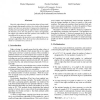Free Online Productivity Tools
i2Speak
i2Symbol
i2OCR
iTex2Img
iWeb2Print
iWeb2Shot
i2Type
iPdf2Split
iPdf2Merge
i2Bopomofo
i2Arabic
i2Style
i2Image
i2PDF
iLatex2Rtf
Sci2ools
126
click to vote
DSD
2003
IEEE
2003
IEEE
Fast Heuristics for the Edge Coloring of Large Graphs
Heuristic algorithms for coloring the edges of large undirected single-edge graphs with (or very close to) the minimal number of colors are presented. Compared to simulated annealing and a grouping genetic algorithm for small graphs, the heuristics were not only faster by orders of magnitude, but almost all solutions had the optimal color number; the rest differed by at most two colors. For large graphs, the heuristics were validated by an evolutionary algorithm. Here, the heuristics often found an optimum or a solution very close to it.
Related Content
| Added | 04 Jul 2010 |
| Updated | 04 Jul 2010 |
| Type | Conference |
| Year | 2003 |
| Where | DSD |
| Authors | Mario Hilgemeier, Nicole Drechsler, Rolf Drechsler |
Comments (0)

